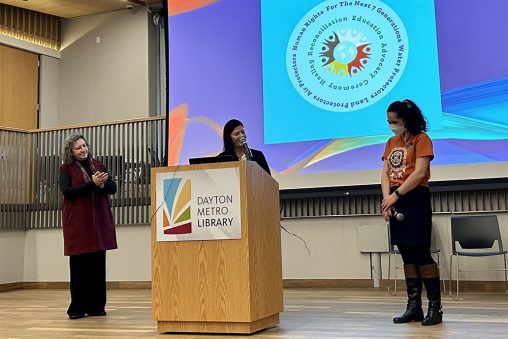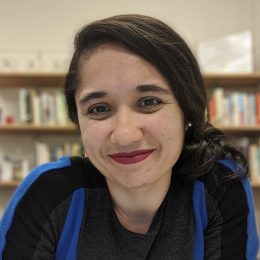
Nicolyn Woodcock, right, assistant director of Wright State’s Asian and Native American Center, with Stephanie Van Hoose, center, director of REACH Indigenous Advocacy, and hydrologist and Wright State alumna Kathy Arnett, the 2023 winner of the REACH Warrior in the Arena Award.
Nicolyn Woodcock, Ph.D., assistant director of the Asian and Native American Center at Wright State University, was honored with REACH Indigenous Advocacy’s 2023 Empowered Ally Award.
She was honored at the second annual REACH Fest on Nov. 17 at the Dayton Metro Library’s main campus downtown.
“Nicolyn exemplifies the definition of what it means to be an empowered ally,” REACH Indigenous Advocacy said. “Her work in supporting the Indigenous student community is not limited to Wright State University and includes collaborations throughout the Greater Dayton Region and beyond.”
Stephanie Van Hoose, director of REACH Indigenous Advocacy, added that she has observed Woodcock empowering Indigenous students through various activities.
“She’s fostering community,” Van Hoose said.
The REACH fest was a celebration of Native American Heritage Month, which runs throughout November. It featured Indigenous music and dance, vendors and speakers addressing the topics of what the letters of the organization’s name, an acronym, stands for: reconciliation and representation, education and equality, advocacy and allyship, community and ceremony, and healing and health.
Woodcock, who joined Wright State in January, said the award is a signal that she is earning trust in the Native American community in Dayton.
“For good reason, the native community has to be careful when new people arrive. I’m not from this area, and I worked out of state for four years prior to Wright State. It’s taken time to build trust,” said Woodcock.
“One of my goals is to be a trustworthy ally,” she continued. “I want to follow the community’s lead and not come in with my own agenda and impose that on them.”
Woodcock said receiving this award tells her that what she is doing is effective, and to keep it up.

Nicolyn Woodcock said the REACH Indigenous Advocacy Empowered Ally Award signals that she is earning trust in the Native American community in Dayton.
In addition to her work with Wright State’s Indigenous students, Woodcock has coordinated with SunWatch Indian Village and Archaeological Park. Members of the Indigenous American Cultural Association took part in a ceremony to honor the live cedar tree that will be harvested to replace SunWatch’s 40-year-old center pole next spring.
Woodcock, who earned a Ph.D. in English literature from Miami University, organized Wright State’s first Indigenous Peoples’ Day Read-a-Thon in October to celebrate Native writers and artists.
She also worked with native-owned Tuscarora Woodworks to buy wooden pins for Wright State students’ Orange Shirt Day fundraiser, which added $543 toward the Native Student Scholarship Fund.
The Empowered Ally Award included a $500 donation to the Native Student Scholarship Fund. The Asian and Native American Center had given two $250 scholarships to eligible Indigenous students annually, but Woodcock said funding was not replenished because of the pandemic’s effects on fundraising and other priorities.
“This $500 gives us a pretty good cushion,” Woodcock said. “Last year we weren’t able to give out the scholarships.”
She said the plan is to resume the scholarship awards in the spring.
“That can make a difference for many students,” she said. “If they’re worried about buying books, that $250 can solve their problem.”
Woodcock said she thinks the award will also help Wright State’s profile.
“Wright State is a household name around the area, but it also has a reputation of being ‘white state,’” she said.
She said now when people do an internet search of “Dayton native community and Wright State,” she hopes Wright State comes up as a top result.
“This is one more opportunity to connect Wright State’s name to the native community,” she said. “This will help us in the long run to continue building relationships in the community and connect with students. It’s one more pathway for us to keep building relationships, which ultimately leads to recruitment and retention.”

 Wright State psychology team studies ways to identify fatigue in pilots, drivers
Wright State psychology team studies ways to identify fatigue in pilots, drivers  Wright State videographer Kris Sproles wins Regional Emmy and Ohio journalism award
Wright State videographer Kris Sproles wins Regional Emmy and Ohio journalism award  Wright State Boonshoft School of Medicine ranked among the nation’s best for 2024 by U.S. News
Wright State Boonshoft School of Medicine ranked among the nation’s best for 2024 by U.S. News  Exposing biotechnology
Exposing biotechnology  Wright State faculty member Dan Noel uses unique background to inspire new leaders
Wright State faculty member Dan Noel uses unique background to inspire new leaders 